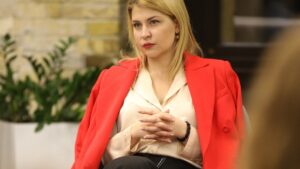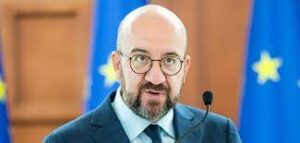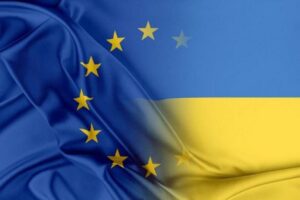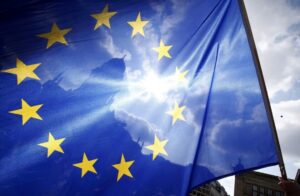
The European Council, which brings together EU heads of state, at a meeting on March 21-22, supported in principle the extension of the liberalization of the trade regime with Ukraine for another year, which provides preferential conditions for Ukrainian exports to the EU, but the final decision is still being agreed upon, said Deputy Prime Minister for European and Euro-Atlantic Integration Olga Stefanishyna.
“The European Council voted in favor of the decision on trade liberalization,” she said at an exporters’ summit organized by Forbes Ukraine on Friday, adding that only a number of technical issues remain.
“The decision on trade liberalization was discussed during the European Council meeting. EU leaders supported the importance of continuing autonomous trade preferences. The approval process is ongoing,” Stefanyshyna said in a comment to Interfax-Ukraine.
The Deputy Prime Minister noted that the conclusion of the European Council meeting states that it calls for continuing work without delay to resolve issues related to autonomous trade preferences for Ukraine “in a fair and balanced manner.”
“At the same time, the need to find a long-term solution within the framework of the EU-Ukraine Association Agreement and the free trade area is enshrined,” Stefanyshyna also said.
Earlier it was reported that the European Council and the European Parliament had previously agreed to extend the suspension of import duties and quotas on Ukrainian exports to the EU for another year, until June 5, 2025, by strengthening protective measures for sensitive agricultural products. The new safeguard measures, in particular, oblige the European Commission to automatically reintroduce tariff quotas if imports of eggs, sugar, oats, corn, cereals, and honey exceed the arithmetic average of imports in 2022-2023.
At the same time, large European agricultural associations and farmers’ unions claim that the proposed measures are insufficient to protect the EU market from imports of Ukrainian agricultural products and demand that restrictions be strengthened. They insist, in particular, that when calculating import limits from Ukraine, data for the pre-war year 2021, when such imports were minimal, should be taken into account instead of the two war years proposed by the European Commission – 2022-2023. In addition, farmers’ associations propose to include wheat in the list of sensitive agricultural products whose exports will be limited by a safeguard mechanism.

European Council President Charles Michel assures that concrete steps to use the proceeds from frozen Russian assets will be taken very quickly so that the first 1 billion euros will be allocated to Ukraine, including for military aid, as early as July 1 this year.
“We have taken a very important decision by making it possible to postpone unexpected revenues – and this is a proposal from the European Commission – and we are determined to act very quickly so that we can take some of this money to support Ukraine, including the possibility of (supporting) military equipment. This demonstrates that the 27 leaders who were around the table understand the gravity of the situation,” he said Thursday in Brussels at a news conference after the European Council meeting.
Michel is convinced that the necessary steps to make the mechanism work will be taken “very quickly”. “These proposals were presented by the Commission yesterday. There is considerable support in the European Council for this approach,” the European Council president said.
According to Michel, the Belgian presidency confirmed that it too “intends to work with all colleagues very quickly”. “This is really very important because there will be more opportunity to support Ukraine with military equipment, with what is urgently needed,” he emphasized.
European Commission President Ursula von der Leyen, in turn, said she was pleased that the leaders had approved the use of emergency revenues from immobilized Russian assets. “This will provide funding to supply Ukraine with military equipment. We can expect to be able to raise €3 billion in 2024 and a similar amount in future years… There is strong support to use the windfall revenues from immobilized assets for military support to Ukraine. I told the leaders that if we act quickly to finalize our proposals, we can disburse 1 billion as early as July 1. The assets are in our hands and if we are quick, there will be concrete actions in the summer,” she explained.
CHARLES MICHEL, EUROPEAN COUNCIL, MILITARY AID, RUSSIAN ASSETS, UKRAINE

The European Council has published the conclusions of the meeting regarding granting Ukraine the status of a candidate member of the European Union.
“The European Council recognizes the European perspective of Ukraine, the Republic of Moldova and Georgia. The future of these countries and their citizens lies in the European Union. The European Council has decided to grant the status of a candidate country to Ukraine and the Republic of Moldova,” says the third section of the conclusions entitled “Application for membership of Ukraine, the Republic of Moldova and Georgia”.
The conclusions note that the European Commission is requested to report to the Council on “the fulfillment of the conditions specified in the Commission’s opinions on relevant applications for membership under its regular enlargement package”. “The Council will decide on further steps once all these conditions are fully met,” the document says.
With regard to Georgia, it is stated that the European Council is “ready to grant the status of a candidate country to Georgia after the priorities indicated in the Commission’s opinion on Georgia’s application for membership are resolved.”
“Each country’s progress towards the European Union will depend on its own merit in meeting the Copenhagen criteria, including the EU’s ability to admit new members,” the conclusions said.

The European Commission will recommend to the European Council that Ukraine and Moldova be granted EU candidate status with further “homework” to be done.
Interfax-Ukraine was informed about this on Thursday in Brussels by a source close to the negotiation process and acquainted with the draft document. “To recommend granting candidate status to Ukraine on the understanding that the next steps will be taken (grant candidate status under the understanding that follows steps are taking),” the agency’s interlocutor quoted the draft document as saying.
Next, he said, is a list of “homework” that Ukraine will have to complete before official negotiations begin. Among them – ensuring the rule of law, the fight against corruption, oligarchs, money laundering. According to the source, this work should be done by Ukraine in any case, since for full membership in the EU it must meet the criteria of Article 49 of the Treaty. “Such a wording will allow countries that are still hesitating to be “taken on board,” the source explained the position of the European Commission. In addition, he also believes that Kyiv will need a significant amount of time to meet the necessary criteria.
With regard to Moldova, the list of “homework” is even longer than for Ukraine. With regard to Georgia, the EC recommends that candidate status be granted only after doing “homework”.
These recommendations have yet to be approved by the EU leaders at the summit, which will be held June 23-24 in Brussels.
The official announcement of the conclusions is scheduled for this Friday, June 17th.
CANDIDATE, EU MEMBERSHIP, EUROPEAN COMMISSION, EUROPEAN COUNCIL, MOLDOVA, STATUS, UKRAINE